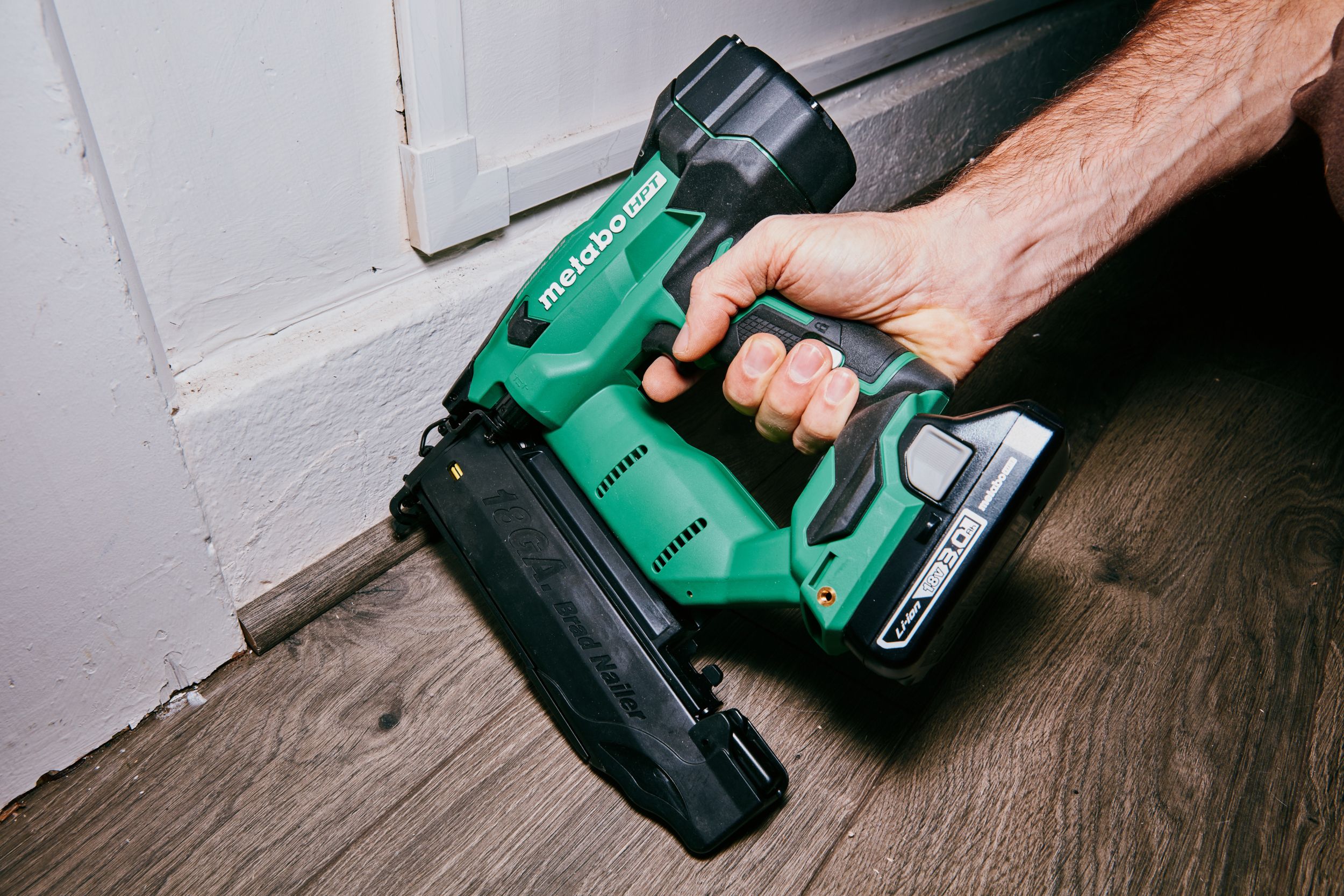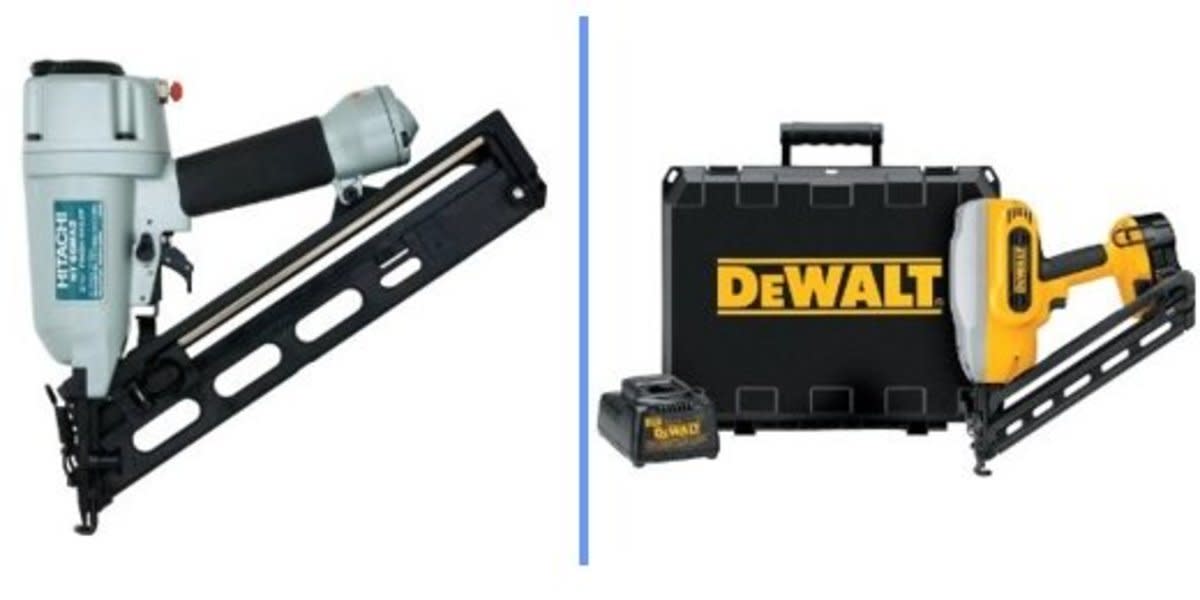Do you find yourself wondering, “Do I really need a nail gun?” Well, you’re in the right place! If you’re a budding DIY enthusiast or a seasoned pro, this article will shed some light on the benefits and practicality of owning a nail gun. From saving time and effort to achieving professional results, we’ll explore why a nail gun could become your new best friend.
Imagine a world where hammering away at nails is a thing of the past. With a nail gun in your arsenal, you can say goodbye to sore thumbs and wasted energy. But is it all just hype? Are nail guns really worth the investment? We’re here to answer those burning questions and help you make an informed decision.
Whether you’re planning a home renovation, building a birdhouse, or tackling any other woodworking project, a nail gun can be a game-changer. Let’s dive deeper into the wonderful world of nail guns and discover why they’re more than just a fancy tool. So, grab your safety goggles, and let’s get started!
So, you’re wondering if you really need a nail gun? Let’s break it down. A nail gun can save you a significant amount of time and effort compared to using a hammer. It’s great for larger projects or if you’re working with tough materials. Plus, it provides a secure hold and reduces the chance of split wood. However, if you’re only doing small DIY projects occasionally, a hammer might suffice. Consider your needs and the scale of your projects before deciding.

Do I Really Need a Nail Gun?
The decision to invest in a nail gun can be a daunting one. As a DIY enthusiast or a professional contractor, it’s essential to evaluate the benefits and drawbacks before making a purchase. In this article, we will explore the various aspects of nail guns and help you determine if you really need one for your projects.
Benefits of Using a Nail Gun
1. Efficiency: One of the primary advantages of using a nail gun is the speed at which you can complete projects. Unlike traditional hammering, a nail gun allows for quick and precise placement of nails, significantly reducing the time and effort required.
2. Accuracy: Nail guns offer a higher level of precision, ensuring that nails are driven straight and flush into the material. This eliminates the risk of bent or warped nails, providing a more professional finish to your work.
3. Reduced Fatigue: Using a nail gun reduces the physical strain on your body compared to manual hammering. The repetitive motion of hammering can cause strain and fatigue over time, leading to discomfort or even injuries. Nail guns, on the other hand, require less physical exertion, allowing you to work for more extended periods without tiring as quickly.
Types of Nail Guns
Before deciding whether you need a nail gun, it’s essential to understand the different types available. Each type has its purpose and is suitable for specific tasks. Here are the main types:
1. Framing Nailers: These nail guns are designed for heavy-duty applications like framing and construction. They drive large, thick nails into lumber with ease, making them ideal for building structures or working on structural elements.
2. Brad Nailers: A brad nailer is a lighter-duty nail gun used for finishing or trim work. It fires small, thin brad nails and is suitable for tasks like installing baseboards, crown molding, or attaching delicate materials.
3. Finish Nailers: Similar to brad nailers, finish nailers are used for detail work and provide a stronger hold than brad nails. They are commonly used in cabinetry, furniture-making, and other applications that require a sturdy bond.
Factors to Consider
When contemplating the need for a nail gun, several factors come into play. Consider the following:
1. Project Types: Assess the kind of projects you work on frequently. If you frequently engage in tasks like framing, constructing, or installing trim, a nail gun may significantly speed up your work.
2. Frequency of Use: Are you a professional contractor who uses a nail gun daily, or are you a DIY hobbyist who only occasionally tackles projects? A high frequency of use may justify the investment, whereas occasional use may not.
3. Budget: Nail guns can range in price depending on the type, brand, and features. It’s essential to establish a budget and determine how much you are willing to spend on a nail gun.
Tips for Using a Nail Gun Safely
1. Read the Manual: Always familiarize yourself with the manufacturer’s instructions and safety guidelines before using a nail gun. Understand the features, maintenance requirements, and any precautions necessary to ensure safe operation.
2. Wear Protective Gear: When using a nail gun, wear safety goggles to protect your eyes from flying debris. Additionally, consider wearing ear protection to reduce noise levels and gloves to protect your hands from potential mishaps.
3. Keep a Clean Work Area: Clear your workspace of any potential hazards or obstructions before using a nail gun. This includes removing loose debris, ensuring the area is well-lit, and keeping others away from the immediate vicinity.
In Conclusion
While a nail gun can undoubtedly improve efficiency and accuracy in various projects, the decision ultimately depends on your specific needs, budget, and frequency of use. Assess your project requirements, consider the benefits and safety measures, and make an informed decision on whether you really need a nail gun.
Key Takeaways: Do I Really Need a Nail Gun?
2. It can provide more precise and consistent nailing compared to hammering.
3. If you frequently do woodworking or construction work, a nail gun can be a valuable tool.
4. However, if you only do occasional small projects, a hammer might suffice.
5. Consider your budget and the frequency of your projects before deciding if a nail gun is necessary.
Frequently Asked Questions
Are you wondering if investing in a nail gun is necessary for your DIY projects? Check out these frequently asked questions to help you decide whether you really need a nail gun.
1. What are the advantages of using a nail gun?
Using a nail gun can save you a significant amount of time and effort compared to manually hammering nails. Nail guns are designed to drive nails quickly and accurately, resulting in a more efficient and precise work process. Additionally, nail guns often have different settings and features that allow you to adjust the depth and power of the nails, ensuring they are securely fastened without damaging the materials.
Furthermore, nail guns reduce the risk of accidental injury that comes with hammering nails. With a nail gun, you have better control over the driving force, minimizing the chances of hitting your finger or experiencing strain from repeated hammering.
2. Is a nail gun suitable for my DIY projects?
Whether or not a nail gun is suitable for your DIY projects depends on the nature and scale of the projects you undertake. If you frequently work on carpentry, woodworking, or construction projects that involve fastening materials together with nails, a nail gun can be a valuable addition to your toolbox. It can significantly speed up your work and increase productivity while maintaining precision.
However, if you only occasionally use nails for small projects or repairs around the house, a manual hammer might be sufficient. Consider the frequency and complexity of your projects, as well as your comfort level with power tools, to determine if a nail gun is a worthwhile investment for you.
3. Can I rent a nail gun instead of buying one?
Yes, renting a nail gun is a viable option for individuals who have limited use for one or are unsure if they will need it in the long run. Renting allows you to access the tool when needed without the upfront cost of purchasing one. Additionally, renting can be advantageous if you require a specific type of nail gun for a particular project, as you can choose the appropriate model without committing to a full purchase.
Before renting, ensure that you understand the rental terms, including the rental duration, costs, and any additional fees for damages or late returns. Also, make sure to familiarize yourself with the specific nail gun’s operating instructions to ensure safe and proper use.
4. What safety precautions should I take when using a nail gun?
When using a nail gun, it is essential to prioritize safety. Always wear appropriate personal protective equipment (PPE), such as safety goggles and ear protection. Make sure the work area is well-lit and clutter-free to avoid accidents. Before operating the nail gun, familiarize yourself with its safety features, such as safety triggers or sequential firing modes.
Remember to keep your hands and fingers away from the nail gun’s path, and never point it towards yourself or others. Regularly inspect the tool for any damages or malfunctions before use. If you are uncertain about any aspect of using a nail gun, consult the manufacturer’s instructions or seek guidance from a professional.
5. Do all nail guns require an air compressor?
No, not all nail guns require an air compressor. While pneumatic nail guns are one of the most common types and do require an air compressor to operate, there are other options available. Cordless nail guns, for example, are powered by batteries and do not need an air compressor. They offer increased mobility and versatility, making them suitable for projects in areas where electricity or an air compressor is not easily accessible.
Additionally, there are gas-powered nail guns that utilize a small internal combustion engine instead of an air compressor. These types of nail guns are typically used for heavy-duty construction projects and can be more expensive to operate and maintain. Consider your specific needs and preferences when choosing the right type of nail gun for your projects.

Summary:
So, do you really need a nail gun? Well, it depends on a few factors. If you’re planning on doing a lot of woodworking projects or construction work, a nail gun can save you a ton of time and effort. It’s faster and more efficient than using a hammer and nails. However, if you only occasionally do small DIY projects, a hammer and nails might be sufficient for your needs. It’s important to consider your specific needs and budget before deciding whether to invest in a nail gun or stick with the traditional tools.
In conclusion, a nail gun can be a handy tool for certain types of projects, but it may not be necessary for everyone. It ultimately comes down to how often you’ll be using it and what types of projects you’ll be working on. So, weigh the pros and cons, consider your needs, and make the decision that’s right for you. Happy building!
